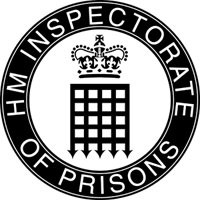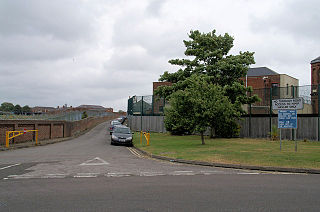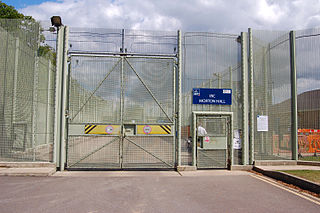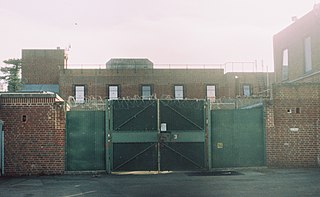
The Home Office (HO), also known as the Home Department, is a ministerial department of the Government of the United Kingdom. It is responsible for immigration, security, and law and order. As such, it is responsible for policing in England and Wales, fire and rescue services in England, Border Force, visas and immigration, and the Security Service (MI5). It is also in charge of government policy on security-related issues such as drugs, counterterrorism, and immigration. It was formerly responsible for His Majesty's Prison Service and the National Probation Service, but these have been transferred to the Ministry of Justice.

HM Prison Pentonville is an English Category B men's prison, operated by His Majesty's Prison Service. Pentonville Prison is not in Pentonville, but is located further north, on the Caledonian Road in the Barnsbury area of the London Borough of Islington, north London. In 2015 the justice secretary, Michael Gove, described Pentonville as "the most dramatic example of failure" within the prisons estate.

His Majesty's Prison Service (HMPS) is a part of HM Prison and Probation Service, which is the part of His Majesty's Government charged with managing most of the prisons within England and Wales.
Parklea Correctional Centre, a privately managed Australian maximum and minimum security prison for males, is located at Parklea, in the north-western suburbs of Sydney, New South Wales. The facility is operated by MTC Ventia and has a current capacity for 1,350 inmates. The Centre accepts prisoners charged and convicted under New South Wales and/or Commonwealth legislation and incorporates a minimum-security work-release centre for inmates nearing release with a capacity of 120. A Compulsory Drug Treatment Correctional unit is incorporated within the centre.
Immigration detention is the policy of holding individuals suspected of visa violations, illegal entry or unauthorized arrival, as well as those subject to deportation and removal until a decision is made by immigration authorities to grant a visa and release them into the community, or to repatriate them to their country of departure. Mandatory detention refers to the practice of compulsorily detaining or imprisoning people who are considered to be illegal immigrants or unauthorized arrivals into a country. Some countries have set a maximum period of detention, while others permit indefinite detention.

His Majesty's Chief Inspector of Prisons is the head of HM Inspectorate of Prisons and the senior inspector of prisons, young offender institutions and immigration service detention and removal centres in England and Wales. The current chief inspector is Charlie Taylor.

Dungavel Immigration Removal Centre is an immigration detention facility in South Lanarkshire, Scotland, near the town of Strathaven that is also known as Dungavel Castle or Dungavel House. It is operated by Mitie Care and Custody, under contract with the law-enforcement command Immigration Enforcement for its detention of immigrants for the Home Office. It is the only such facility in Scotland.

HM Prison Huntercombe is a Category C men's prison, located near Nuffield in Oxfordshire, England. It is operated by His Majesty's Prison Service.
HM Prison Whatton is a Category C men's prison, located in the village of Whatton, near Bingham in Nottinghamshire, England. The prison is operated by His Majesty's Prison Service, and houses males convicted of sexual offences.
Dover Immigration Removal Centre was an immigration detention centre, located in the historic citadel of the Western Heights fortifications in Dover, England. The centre was operated by Her Majesty's Prison Service, and formally closed in November 2015. Dover has been designated as an historic site by English Heritage.

Haslar Immigration Removal Centre was an immigration detention centre, located in Haslar, Hampshire, England. The centre was operated by Her Majesty's Prison Service. The centre closed in 2016 with the Ministry of Justice planning to retain the site for use as a prison – plans which were later scrapped. In September 2022, the Guardian reported that Haslar immigration removal centre would reopen in late 2023.

HM Prison Morton Hall is a Category C men's prison, located in the village of Morton Hall in Lincolnshire, England. The centre is operated by His Majesty's Prison Service. It was previously a women's prison and from 2011 to 2021 it was an Immigration Removal Centre.

Campsfield House was an immigration detention centre located in Kidlington near Oxford, England, operated by private prison firm Group 4 under contract with the British government. For 25 years, it was the site of a regular monthly protest from human rights campaigners and saw a number of internal protests, hunger strikes and two suicides. However, it was highly praised by the Chief Inspector of Prisons at the last full inspection in 2014. Campsfield closed in 2018.
Civilian oversight, sometimes referred to as civilian review or citizen oversight, is a form of civilian participation in reviewing government activities, most commonly accusations of police misconduct. Members of civilian oversight boards are generally not employed by the government entity which they are reviewing. These groups are tasked with direct involvement in the citizen complaints process and develop solutions to improve government accountability. Responsibilities of civilian oversight groups can vary significantly depending on the jurisdiction and their ability to become influential. Oversight should not simply criticize but should improve government through citizen support for government responsiveness, accountability, transparency, and overall efficiency.

Prisons in Ireland are one of the main forms of punishment, rehabilitation, or both for the commission of an indictable offense and other offenses.
Although some means of controlling foreign visitors to the United Kingdom existed before 1905, modern immigration border controls as now understood originated then. Although an Alien Act was passed in 1793 and remained in force to some extent or other until 1836, there were no controls between then and 1905 barring a very loosely policed system of registration on entry.
Brook House Immigration Removal Centre is a privately managed detention centre, operated by Serco on behalf of Home Office. The facility is situated in the grounds of Gatwick Airport, Crawley, West Sussex.
Immigration detention in the United Kingdom is the practice of detaining foreign nationals for the purpose of immigration control. Unlike some other countries, UK provisions to detain are not outlined in a codified constitution. Instead, immigration enforcement holds individuals under Powers granted in the Immigration Act 1971 and by the Home Office Detention Centre Rules (2001). The expressed purpose of immigration detention is to "effect removal; initially to establish a person's identity or basis of claim; or [implement] where there is reason to believe that the person will fail to comply with any conditions attached to a grant of immigration bail." Detention can only lawfully be exercised under these provisions where there is a "realistic prospect of removal within a reasonable period".
Liberty Kitchen is a social enterprise based at HM Prison Pentonville, London. It exists to train prisoners in high-quality food preparation, and to employ ex-prisoners to sell this food at street markets. Its intention is to open up opportunities to the men, including qualifications and the possibility of self-employment, and thus reduce recidivism.
After Exploitation is a UK-based non-profit organization that investigates the unpublished outcomes of modern slavery survivors. The group uses Freedom of Information requests to gather data on wrongful deportation, detention, and failures by agencies to refer victims for support.











